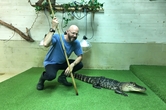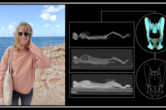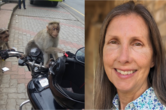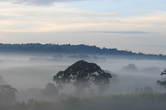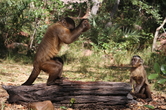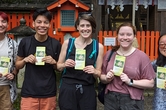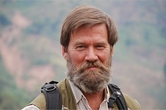Nina Negi: a high school student with a passion for nature
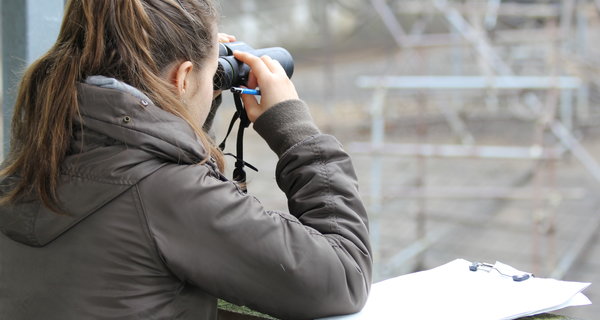
10-Day-Internship at the Kyoto University Primate Research Institute, Inuyama
by Nina Negi
I couldn’t believe it when Andrew JJ MacIntosh, D. Sc. (Associate Professor of the Kyoto University Primate Research Institute) answered my email. He told me that even though the Primate Research Institute had never taken any high school interns before, he’d be happy to organize an internship for me.
The internship was part of the curriculum of the German School Tokyo Yokohama for every Year-10-student. Students learn how to write their CV and about the application process. They can apply to any business or institution of their choice. Meeting Jane Goodall in the spring of 2014 in Bali had a big impact on me and my choice was the Primate Research Institute in Inuyama, Japan.
The months leading up to April 7th seemed endlessly long. I spent the time wondering what I would be doing during the internship. The researchers were surely going to be very busy with their work and I was unsure if I would actually be able to help with anything.
This worry was completely unnecessary, as Andrew [MacIntosh] handed me a fully-packed schedule on my first day. Everyday I would be going to a different department and participating in all kinds of activities, ranging from animal care work, measuring animal behaviour, comparative cognitive science and even attending seminars and meetings. My main project at the end of the internship would be to create my very own podcast for The PrimateCast.
The next 10 days were over way too quickly. From the very first day on, when I was being introduced to everyone and given an orientation tour around the PRI (Primate Research Institute), I knew that I had come to the right place.
On the second day, I started off with reading up on Primatology in general. For this purpose, Andrew gave me the books 'Primates in Perspective‘ and 'Primate Behaviour‘. I was able to relate to the author saying that we are fascinated by apes, as we see ourselves in them. In the apes we see the same emotions, empathy, interactions and reactions.
I learnt that while observing, it is important to stay objective and not project ourselves onto the primates, as this will bias the results.
On day three, I went down to the Center for Human Evolution Modeling Research with Miyabe-Nishiwaki-san. After putting on the whole outfit - two pairs of pants and two shirts, gloves, a head cover, a mask and wellingtons [scrubs!] - I was ready to begin my day. Two anaesthetised monkeys were brought in that day, one had previously broken it’s leg and was being checked up on again. The other one would not gain any weight, no matter how much it ate.
The most interesting part of the morning though, was probably the chimp Leo. A few years ago, he had been paralysed from the neck down. Thanks to intensive rehabilitation work, Leo had now regained control over his upper body, and his legs were also recovering. It amazed me and I felt deep respect for the vets who had brought him back to almost complete normality again.
On day four, I also did animal care work, this time at the JMC (Japan Monkey Center). I spent the day cleaning the cages and feeding the lemurs. I was shown the different methods of preserving deceased monkeys (stuffed, bone structure, formaldehyde, and plastifying). Recently, a new method of replacing the liquid in the body with plastic (‘plastifying’) has been developed. This way the actual body with the real organs can be preserved and turned into a model.
I noticed what a big difference it made that the JMC was open to the public. While allowing visitors to be able to experience the monkeys up as close as possible, the impact on the monkeys and their welfare had to be considered.
After the weekend, 'comparative cognitive science‘ was written on my schedule for Monday (day 5). I was not quite sure what to expect. Ikuma [Adachi] -san explained to me that this term refers to the chimpanzee experiments, for which the institute was so well known. The chimpanzee Ai had only recently learned the number 10-20 and when I walked in, she was being tested on this. Chimp Ayumu didn’t want to come in that day. He was a teenager now, and didn’t want to do everything the way his mother did. I could kind of relate to that.
One thing I noticed was how every time a chimp got the answer wrong, it would scratch itself. This, another student explained to me, was because it was frustrated for getting the answer wrong. Very much like humans, this would annoy the chimp.
The computer made two different noises. One when the chimp got the answer right and another sound when it got the answer wrong. As the clicking sound triggered an automatic response in Pavlov's dogs, after a while, these sounds also triggered automatic responses in the chimp's brain. As soon as it heard the sound for ‘right’, it stretched out its hand, because it knew a treat was being released.
In between the tests, I had a very interesting conversation with Ikuma-san. He told me a lot about the prefrontal cortex and face recognition.
On the 6th day, I attended the EcoSeminar, where all the department members introduced themselves and very briefly talked about what they were studying at the moment. So many diverse topics came up and I realized that there was a lot more to Primatology than I had initially thought.
Wednesday, day 7, I spent mainly observing the behaviour of the Takahama and Wakasa Japanese Macaque groups in the outside enclosures. After observing the monkeys for two hours in the morning and three hours in the afternoon, I was amazed. In only this short period of time, single individuals of the group stood out to me already. Their behaviour varies greatly, deepening on the rank of the monkey. After putting the data in to the computer, Andrew was able to create graphs from it, allowing us to compare the two groups.
Days 8,9 and 10 (I came in for an extra Saturday!), were spent working on the podcast with PhD student Sofi [Bernstein]. We had decided that the topic of the podcast should be 'Finding Your Passion‘.
Thursday we worked our way through the PRI, interviewing eight different professors and students. After having begun a conversation with them, it was hard to come to an end. There was so much I wanted to ask them and I am very thankful for their patient and passionate answers!
The whole Friday and Saturday, Andrew, Sofi and I, edited the interviews and added our own parts. I would have never thought that there is so much work behind one single podcast! During our own recording sessions it was hard to stay serious sometimes and we had to cut out a lot of our laughing afterwards.
This has only been a very short summary of my 10-day internship. There was so much more and so many people and events I haven’t even mentioned yet! This internship was more than I could have ever imagined. What surprised me probably most is the fact that there is such a wide variety of jobs. Even though all these people had focused on Primatology, each person had found their very own niche and topic that they were most interested in. The researchers at the PRI are flying to places all over the world, collecting data and meeting other scientists. This is exactly what I would like to do, too.
A lot of my classmates did their internships at companies in Tokyo, doing office jobs, repeating the same procedures everyday. On the contrary, I had come to the tiny town of Inuyama in Aichi prefecture to work with "monkey-crazy" researchers, and I couldn’t have made a better decision.
I could continue on for pages, writing about:
- -the openness and friendliness of everyone at the institute, how every person shared some of their time with me, explaining what they were doing.
- -how I grew fonder of the monkeys everyday and realized how unique and different the species and every individual actually was.
- -how Andrew had become my mentor and put together this amazing schedule for me. A schedule which made sure that I always had plenty to do. Enabling me to get an overview of what primatology is as well as chances to take a deeper look into specific areas of this fascinating area of science.
- -how wonderful it was to have my own desk in my own office, with a direct view out onto the chimpanzee enclosure.
My head is still buzzing with all the new things I learnt during those 10-days. It was a first step into the real working-world and it couldn’t have been a better one. I know now, that I want to work in the field of environment / animal conservation and I’m definitely considering going into Primatology, too.
I am thanking everyone who made these 10-days unforgettable for me.
7 - 18 April, 2015
Check out Nina's podcast here. And to see Nina's story written up in the newsletter of her former school, Greenschool Bali, click here.
